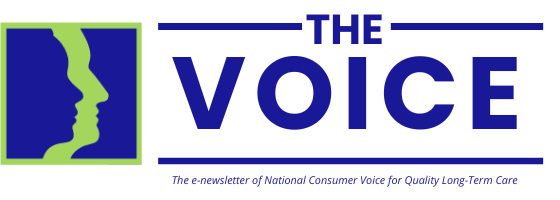|
September 6, 2022
In this Issue:
- Public Citizen Releases Report Detailing Incomplete Data in the Federal Nursing Home Ownership Database
- PHI Releases Annual Data on Direct Care Workers Report
- The Human Rights Campaign Foundation and SAGE have launched the 2023 Long-Term Care Equality Index Survey
- Elder Justice Initiative Releases Resources Addressing Diminished Decision-Making Capacity
- ACL Webinar on The Voices of People with Disabilities and Older Adults - Strengthening Advocacy in the HCBS Settings Rule
- Consumer Voice's Resident's Voice Challenge Deadline Extended
|
|
Public Citizen Releases Report Detailing Incomplete Data in the Federal Nursing Home Ownership Database
Public Citizen published a report, Is It Private Equity? We Can't See. In 2010, when Congress passed the Affordable Care Act, new requirements were issued for the disclosure of nursing facility ownership. However, Public Citizen has found that the Department of Health and Human Services (HHS), in addition to not creating regulations for the collection of ownership information, hosts a database which does not share comprehensive ownership information.
In their research, Public Citizen identified public equity firms with incomplete ownership information or that were missing from the database entirely. The report details the substandard and often horrendous care many private equity-owned nursing homes provide and demonstrates why it is crucial for residents and their loved ones to know who owns a nursing home.
In their conclusion, Public Citizen shared recommended next steps for HHS, including implementing long-overdue disclosure regulations.
Read the full report.
|
|
PHI Releases Annual Data on Direct Care Workers Report
PHI has released a report, Direct Care Workers in the United States: Key Facts. This report covers home care workers, residential care aides, and nursing assistants and details their roles, challenges, and future demands based on U.S. population projections. PHI writes,
Low wages combined with a high rate of part-time work make it challenging for direct care workers to financially support themselves and their families. Median annual earnings for direct care workers are just $21,700, 40 percent of direct care workers live in low-income households, and 43 percent rely on public assistance, such as Medicaid, food and nutrition assistance, or cash assistance. These trends both reflect and perpetuate the racial and gender inequalities faced by direct care workers, who are largely women and people of color.
By 2060, the population of adults over the age of 65 will nearly double what it was in 2016. Additionally, this population will become more diverse. As a result, the need for direct care staff will increase, as will the need for cultural and linguistic competency among direct care staff.
Read the full report.
|
|
The Human Rights Campaign Foundation and SAGE Have Launched the 2023 Long-Term Care Equality Index Survey
The Human Rights Campaign Foundation and SAGE have launched their 2023 Long-Term Care Equality Index survey for long-term care communities who wish to participate in the LEI in 2023. To participate in the LEI, facilities must first sign the "Commitment to Caring" pledge. Facilities that do so will receive a customized link to the LEI survey. The survey will be open until November 30, 2022.
The LEI is a national benchmarking tool that evaluates senior housing communities based on the equity and inclusion of their LGBTQ+ residents.
|
|
Elder Justice Initiative Releases Resources Addressing Diminished Decision-Making Capacity
The Department of Justice's Elder Justice Initiative (EJI) is releasing session recordings from the Elder Justice Decision-Making Capacity Symposium: The Role of Decision-Making Capacity in Elder Justice Cases that Reach Civil and Criminal Courts held in April. EJI will also share a resource guide with materials for elder justice professionals and for the public.
This virtual symposium educated viewers on the capacity of older adults to make independent personal and financial decisions.
These resources can be found on the symposium website.
|
|
ACL Webinar on The Voices of People with Disabilities and Older Adults - Strengthening Advocacy in the HCBS Settings Rule
Join the Administration for Community Living (ACL) for a webinar on Friday, September 23 at 2:00pm ET entitled, "The Voices of People with Disabilities and Older Adults - Strengthening Advocacy in the HCBS Settings Rule." The goal of this webinar is to educate participants on how and when to receive and/or provide feedback on state efforts to comply with the Home- and Community-Based (HCBS) Settings Rule, which requires that states receive feedback on how they can best implement the Rule.
Register Now
|
|
Consumer Voice's Resident's Voice Challenge Deadline Extended
Consumer Voice has extended the deadline to submit entries for the 2022 Resident's Voice Challenge. Residents now have until Friday, September 9, to submit artwork, written responses, or videos for this year's Residents' Rights Month theme, "Inspiring Unity within Our Community."
To submit entries, email them to info@theconsumervoice.org.
|

|
